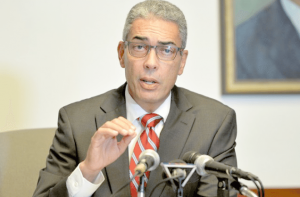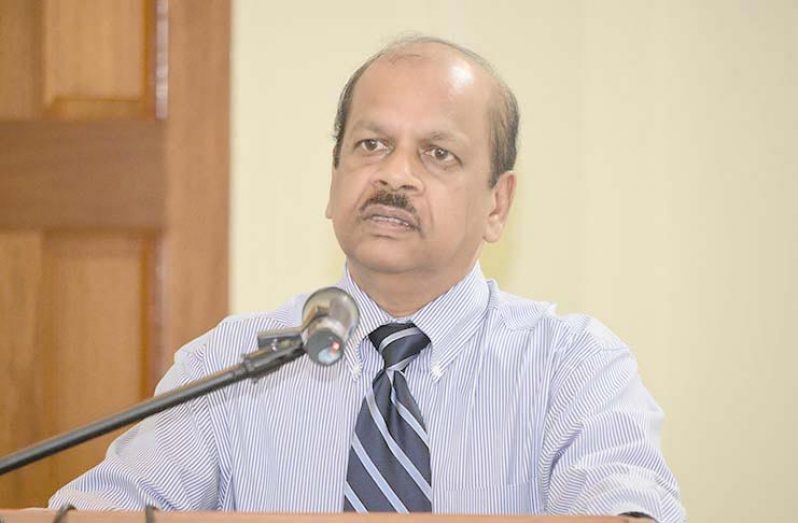– BoG Governor tells regional forum COVID-19 hitting key productive sectors
– but Guyana still maintains sound banking system
By Lisa Hamilton
WHILE Guyana’s projected growth rate with oil has been tempered from approximately 86 per cent to 57 per cent due to the COVID-19 pandemic, the country’s projected non-oil growth, previously pegged at some five per cent, has been revised to negative five to seven percent, or even lower, as major sectors take a big hit.
This was the projection given by Governor of the Bank of Guyana, Gobind Ganga, who made public the information at the online edition of the Caribbean Economic Forum 2020 on Thursday evening.
Though Guyana is the only Caribbean country projected to experience economic growth this year due to oil production, the Governor said that the country’s economic fundamentals, which were very favorable prior to the pandemic, have still fallen from high heights.
A SHIFT DOWNWARDS

“Our inflation rate would have been very, very low, single digit; we would have had an increase in reserves as we were projecting; our exchange rate would have remained, and we expect that to remain, relatively stable,” Ganga stated, adding:
“However, with the impact of COVID-19, obviously, with respect to global demand declining from growth, we would have seen a significant decline in economic activities. With oil, after COVID-19, we would have projected 57 per cent growth in GDP which would have been a significant decline from where we were projecting to be prior to COVID-19. For non-oil growth, we are now looking at negative five to seven per cent; it could even be more if this is prolonged because major sectors would have been hit.”
Like its Caribbean neighbors, the sectors Ganga pinpointed as taking the greatest hit are the services, transportation, communication, education administration, whole sale and retail, manufacturing and agriculture along with some other sub sectors.
He stated, “So, what we would have seen, coming out from a very glorious outlook where we were the star of the Region and even in the world, to one where we are now just like any ordinary country being impacted by this pandemic.”
A SOUND BANKING SYSTEM
Though this is the case, the Bank of Guyana Governor said that this does not mean that everything is bad or all downhill for Guyana. He said that the country is still looking forward to some form of stability, growth and development as it moves forward.
Ganga said that a number of fiscal monetary policies have been implemented to combat the impact on the economy. On the fiscal front, this includes the removal of Value Added Tax (VAT) from utilities and domestic air travel; earlier pension payments; the removal of excise duties on essential products and more.
“We were trying to provide more disposable income to everyone to ensure that there is a basic indirect transfer so one would be able to do the necessary adjustments for welfare improvement…if you don’t have an enabling environment in the financial system, you’re not going to continue with growth and development,” he explained.
Regarding firms, he noted that they too are benefitting from deferrals and removal of excise duties. Credit facilities also have a moratorium of six months regarding the repayment of loans as well as individuals directly impacted by the pandemic.
Apart from that, the Governor said that a very accommodating monetary policy is being pursued to ensure that there is enough liquidity to allow for borrowing while keeping the inflation rate where it currently is, below one per cent.
He stated: “What we would have provided from the Central Bank would have been that confidence in our economy from the financial perspective in that we have a sound banking system, we have a situation where the economic fundamentals remain very favourable for growth and development so that we can encourage investors to come in [and] households can also have this confidence going forward that their real disposable income remains intact.”
REGIONAL COUNTRIES CHALLENGED

Also attending the forum was Governor of the Eastern Caribbean Central Bank, Timothy Antoine. He said that the Eastern Caribbean Currency Union (ECCU) was projecting to grow by 3.5 per cent prior to the pandemic but the latest projection is that the ECCU will contract by 10 to 20 per cent in 2020 alone.
Antoine reminded that the impact is not unique to the ECCU as the world is facing its worst economic crisis in almost 100 years with the global economy expected to contract by at least five per cent.
“The impact has been great on large and small economies. The US is going to contract by eight per cent; the UK, by 10 per cent; Africa, for the first time in 25 years will actually contract and, of course, all countries in the CARICOM area, with the exception of Guyana, will contract this year. We are all in recession,” he said.
Meanwhile, Governor of the Bank of Jamaica, Richard Byles, said that for the last seven years Jamaica was on the track of a very strong economic programme with its debt to GDP being reduce from 145 to 92; its reserves were built from just below a billion to over 3.6 billion; unemployment was down to 7.2 per cent and major reforms were made in the financial sector.
However, in one sweep, he said that the pandemic set back progress in all of these areas for the country. “COVID-19 came an interrupted that process and has set us back but we feel that if we pick up from where we left off we will be able to achieve — maybe a little later than we had hoped — but we will achieve exactly what we wanted, which is macro financial stability, low inflation and economic growth.

Jamaica had a growth projection of approximately 1.1 per cent for the year but this has been revised to negative four to seven per cent.
Similarly, Barbados’ primary surplus and fiscal at six per cent of GDP but this has been cut to an estimate of one per cent of GDP which now highly depends on how consistently it is able to maintain economic activity moving forward.
Governor of the Central Bank of Barbados, Cleviston Haynes, said that over the last two years, the country worked assiduously to restore its reserves and lower its debt but now faces an uphill climb.


.jpg)











